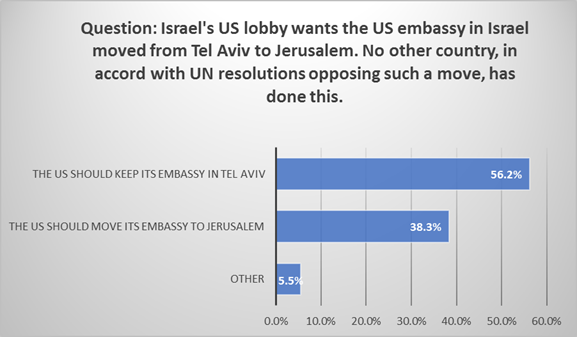Poll: Most Americans
don't want US embassy moved to Jerusalem
Candidates keep making
the promise to get elected
By Grant F. Smith, Director of Research, IRmep
An
IRmep poll fielded by Google Consumer Surveys January 27-29
reveals 56.2 percent of the US adult Internet user
population prefers the US keep its Israel embassy in Tel
Aviv.
Only 38.3 percent prefer moving it to Jerusalem, while
5.5 percent are either uncertain or have other responses.
The statistically-significant survey has an
RMSE score of 3.3%.
Israel’s policy since its founding
in 1948 has been to locate foreign embassies in Jerusalem
rather than Tel Aviv. However, the original 1947 UN
agreement partitioning Palestine into Arab and Jewish states
required that Jerusalem be “internationalized.” Israel’s US
lobby began laying the groundwork for moving the US
embassy—in hopes that others would follow and stay—in the
late 1970s. In 1979, the Zionist Organization of America
(ZOA) submitted a petition with 100,000 signatures to
President Jimmy Carter—who had campaigned in favor of a
move—asking him to formally withdraw the US from the 1947 UN
Agreement and relocate the embassy. Carter refused.

In 1984 the American Israel Public Affairs
Committee (AIPAC) and the Anti-Defamation League (ADL),
working with conservative Christian organizations such as
the Moral Majority, provided testimony before the Senate
Foreign Relations Committee in support of a “move the
embassy” bill introduced by Senator Daniel P. Moynihan
(D-NY). AIPAC argued in
18 pages of testimony and an accompanying booklet that
US policy was "divorced from reality" and was an "affront"
to Israel and that "the American Jewish community wants to
see an end to the anti-Israel tilt that for decades has
afflicted US policy toward Jerusalem." AIPAC also claimed
that US religious demographics were strongly in favor,
because "most Christian Americans...also are likely to
support a change." The Reagan administration strongly
opposed the bill as undermining its ability to “play an
effective role in the Middle East peace process.”
AIPAC fully committed to passing a
law in the mid-1990s to thwart the Oslo peace process. The
Oslo accords sought a peace treaty between Israelis and
Palestinians through negotiation of borders, addressing the
issue of Israeli settlements and the final status of
Jerusalem. AIPAC was determined to create new facts on the
ground by predetermining the outcome,
stating it was “imperative to establish now the US
conviction that realistic negotiations must be premised on
the principle that Jerusalem is the capital of Israel and
must remain united.” AIPAC’s chosen vehicle was the
presidential candidacy of Kansas Republican Senator Bob
Dole. Dole was not an obvious choice.
Dole was conservative on US foreign
aid to Israel, proposing a 5 percent cut in 1990. That same
year
Dole passionately urged that the Senate not pass
Concurrent Resolution 106 which declared that Congress “strongly
believes that Jerusalem must remain an undivided city.” Dole
instead argued “…[the Arabs] regard Jerusalem as part of their
homeland and they have a strong emotional attachment to it.
I am not trying to argue that point; I am only trying to
underscore how sensitive and how complex this issue is. The
real point is not whether I, or even 100 Senators, believe
that Jerusalem should or should not be the capital of
Israel. The issue is whether the Senate of the United States
should be jumping into the middle of an extremely sensitive
situation, without looking, in many cases without even
thinking, first." Despite Dole’s opposition, the resolution
passed.
However, in 1995 Dole was running
for president against incumbent Bill Clinton, seeking
campaign contributions from big Israel lobby donors and
votes in key states. Dole expressed his entirely new
position sponsored in a bill to move the embassy,
co-sponsored by Arizona Republican Senator Jon Kyle. Dole
proclaimed, "In my view, the United States does not have to
wait for the end of final status talks to begin the process
of moving the US embassy to Jerusalem." Delaware
Senator Joe Biden was also a staunch supporter. “Moving
the US Embassy to Jerusalem will send the right signal, not
a destructive signal. To do less would be to play into the
hands of those who will try their hardest to deny Israel the
full attributes of statehood.”
Zionist Organization of America
legal scholar
Malvina
Halberstam and three AIPAC legal researchers worked
diligently to make sure the new bill would not be challenged
on constitutional separation of powers grounds. The
resultant bill leveraged congressional prerogatives over
spending authorizations, demanding that $100 million of the
US State Department’s “Acquisition and Maintenance of
Buildings Abroad'' budget for fiscal years 1996-1997
prioritize Jerusalem embassy construction. Under the act, no
further State Department overseas building funding for any
project would be authorized until the State Department
certified the embassy was open by May 31, 1999 at the
latest.
However, the bill contained a
ZOA-AIPAC engineered waiver designed to avoid constitutional
challenges that the law infringed on the president’s
authority over foreign policy. The president could keep US
State Department overseas building funds intact by issuing a
waiver every six months certifying that the move could not
be made on “national security grounds.” On the campaign
trail in 1992 Bill Clinton professed, “I believe in the
principle of moving our embassy to Jerusalem.” He never
repeated the notion after being elected to office. After
providing an opposing legal opinion to congress and even
threatening a veto, President Clinton grudgingly allowed the
Jerusalem Embassy Act of 1995 to become law without
signing it.
Major US presidential candidates who campaigned in favor of moving
the US Embassy from Tel Aviv to Jerusalem
|
Democratic Party
|
Republican Party
|
|
Joe Biden
|
George W. Bush
|
|
Jimmy Carter
|
Ted Cruz
|
|
Bill Clinton
|
Bob Dole
|
|
Hillary Clinton
|
Gerald Ford
|
|
Michael Dukakis
|
John McCain
|
|
Gary Hart
|
Mitt Romney
|
|
John Kerry
|
Marco Rubio
|
|
Walter Mondale
|
Donald Trump
|
Until the election of Donald Trump,
it has been a bit of a running joke within Israel lobby
circles that candidates campaigning for the highest office
in the land always promise to move the embassy, only to
renege after assuming power. AIPAC officials claim the issue
is always at the very top of their agenda, and work
tirelessly to make sure it appears—despite growing and vocal
opposition—in
Democratic party platforms. GOP
party platforms, which court the evangelical Christian
vote, are much easier. At the beginning of 2001, AIPAC
executive Howard Kohr asserted "The issue of Jerusalem
remains a priority for us…It will always be on the agenda.”
AIPAC, he claimed "takes President [George W. Bush] at his
word; he has stated he will begin the process of moving the
embassy to Jerusalem. This administration has made a
hallmark of standing by its commitments." However, before,
during and after 9/11 and the disastrous US invasion of
Iraq—a policy at the forefront of neoconservative regional
designs and quietly supported by AIPAC—Bush resisted all
further Israel lobby efforts to move the embassy with
waivers and signing statements. President Obama followed
suit, signing a presidential waiver not to move the embassy
like clockwork every six months.
Donald J. Trump has been as vocal as
any presidential candidate in promising to move the embassy.
Trump declared in a 2016 AIPAC candidate forum that as
president he would "move the American embassy to the eternal
capital of the Jewish people, Jerusalem." This statement may
have been to soften his earlier proposals to tighten the
reigns on US foreign aid—and more worryingly to the
lobby—“remain neutral” on the Israel Palestine front, “the
toughest negotiation of all time.”
Conference of Presidents of Major
American Jewish Organizations leader Malcom Hoenlein claims
the issue can be finessed in order to avoid generating
controversy. Hoenlein recently admitted that the move is not
a pressing matter for the Israeli government officials he
frequently consults. Interested parties beyond the lobby,
including Palestinians abroad and in the US, who are rarely
consulted, are closely watching for indications that
President Trump will follow through on growing
post-election rhetoric and allow the Jerusalem Embassy
Act of 1995 to come into force by not signing a waiver in
June.
Whatever action President Trump
takes—or in this case fails to take—the record is clear.
Those in favor of moving the US embassy to Jerusalem have
never presented a compelling case directly to the American
public about what US national interest it would serve. This
is because there is no case. It is also why—when informed of
its true authors and UN opposition—Americans do not approve
of the move.
|

